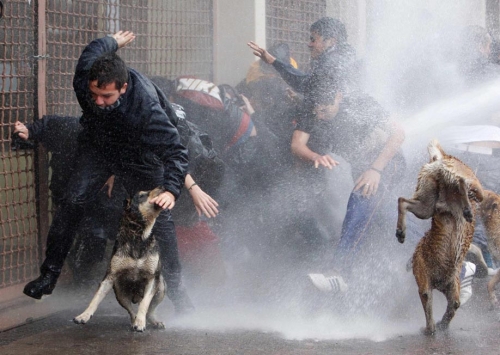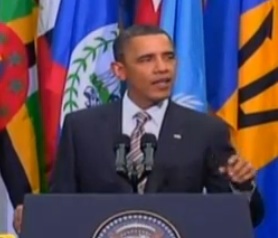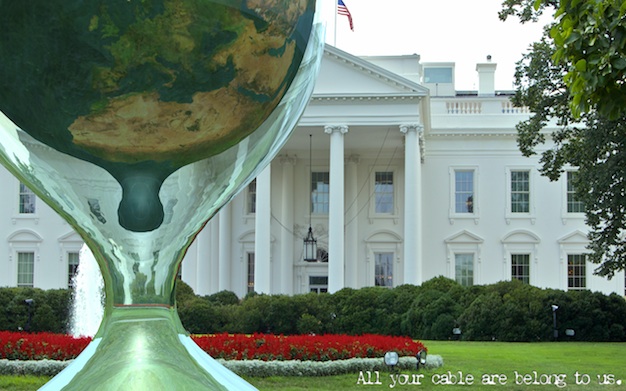UPDATE: Chilean journalist @PatricioMery advises ex-detective Ulloa has now left the Ecuadorean Embassy in Santiago, and confirms he is "safe and sound". He adds with a wink: "I don't know where he is. ;-)"
WL Central presents an exclusive interview with Chilean journalist Patricio Mery, who claims the CIA has been actively plotting to destabilise or even assassinate Ecuador’s President Rafael Correa, after US anger over decisions such as the granting of political asylum to Julian Assange and the termination of the US lease on a military base in Manta.
Syria:
Over the past few years, the international left has derived much satisfaction from the course of South American political and economic integration. The novelty of such integration is that it has proceeded along progressive lines and has been pushed by regional leaders associated with the so-called "Pink Tide." With so many leftist leaders in power, it is plausible to surmise that a left bloc of countries might challenge Washington's long-term hemispheric agenda. Yet, behind all of the lofty rhetoric and idealism, serious fissures remain within South America's leftist movement, both within individual countries and within the larger regional milieu.
That, at least, is the impression I got from reading U.S. State Department cables recently declassified by whistle-blowing outfit WikiLeaks. Take, for example, the Luiz Inácio "Lula" da Silva administration in Brazil, which at times encouraged a "hostile" climate against the Free Trade Area of the Americas or FTAA, a corporately-sponsored plan backed by Washington, while on other occasions encouraging "public doubt and confusion through its own often-conflicting statements" about the accord. Behind the scenes, the Brazilian government was much more divided on the matter than commonly portrayed, torn between its South American loyalties on the one hand and the desire to gain access to the lucrative U.S. market for agricultural and industrial goods on the other.

Over 800 arrested during running street battles, as student protesters defy official protest ban to demonstrate for equal access to education.
For two months now, young Chileans have been taking to the streets to protest against neoliberal reforms in education spearheaded by the country’s right-wing government. Yesterday, the protracted youth uprising culminated in the public defiance by thousands of high school and university students of an official protest ban. Riot police responded with tear gas, water canons, baton charges and mass arrests.
 US President Barack Obama, currently on a trip through Latin America, visited Chile yesterday to further expand trade relations and military and security cooperation between the two countries. He did not intend for his visit to be about the US’ history of interfering in Chile’s domestic affairs or, for that matter, human rights. But, the first question President Obama was asked was the following: Is the United States “willing to ask for forgiveness for what it did in those very difficult years in the ‘70s in Chile?”
US President Barack Obama, currently on a trip through Latin America, visited Chile yesterday to further expand trade relations and military and security cooperation between the two countries. He did not intend for his visit to be about the US’ history of interfering in Chile’s domestic affairs or, for that matter, human rights. But, the first question President Obama was asked was the following: Is the United States “willing to ask for forgiveness for what it did in those very difficult years in the ‘70s in Chile?”
President Obama answered, “I think it’s very important for all of us to know our history. And obviously the history of relations between the United States and Latin America have at times been extremely rocky and have at times been difficult.” But, “I think it’s important, though, for us, even as we understand our history and gain clarity about our history, that we’re not trapped by our history.”
Furthermore, President Obama said he could not “speak to all of the policies of the past” but could “speak certainly to the policies of the present and the future.” As he noted that the US has supported democratic reform in Chile for two decades, President Obama refused to acknowledge the true history of US relations with Chile, a history that involved supporting Gen. Augusto Pinochet in a CIA-backed coup in 1973.
President Obama may not want to get “trapped” in a discussion that leads him to have to take responsibility for the country, which he currently presides over, but files released between 1998 and 2003 show, according to investigative reporter Peter Kornbluh, “The US created a climate of a coup in Chile, a situation of chaos and agitation.”
 Aftenposten: READOUT NORTH ATLANTIC COUNCIL MEETING JANUARY 28, 2009
Aftenposten: READOUT NORTH ATLANTIC COUNCIL MEETING JANUARY 28, 2009
"AFGHANISTAN: ISAF Senior Civilian Representative Gentilini said the Afghans were eager for NATO to respond to its proposal for a military technical agreement, sent to NATO in early January. The SCR and several Perm Reps stressed that a MTA with the Afghans could help address the issue of civilian casualties, but many cautioned that the legal difficulties involved in negotiating such an agreement called for the Alliance to proceed with caution. Saying it needed more time to seek instructions, Hungary blocked consensus on a decision that fully filling the Elections Support Force (ESF) should take priority over filling the NATO Response Force (NRF), which would have allowed nations to pull NRF components for use in the ESF. The NAC will revisit the issue next week."
Aftenposten: AMBASSADORS JANUARY 11 MEETING WITH NATO SENIOR ISAF REPRESENTATIVE ON GIROA PROPOSED AFGHANISTAN-NATO MILITARY TECHNICAL AGREEMENT
 The Telegraph: Suleiman told Israel he would 'cleanse' Sinai of arms runners to Gaza
The Telegraph: Suleiman told Israel he would 'cleanse' Sinai of arms runners to Gaza
"Omar Suleiman, the new vice-president of Egypt, told the Israelis he wanted to start “cleansing the Sinai” of Palestinian arms smugglers, according to leaked cables."
The Telegraph: Egyptian 'torturers' trained by FBI
"The US provided officers from the Egyptian secret police with training at the FBI, despite allegations that they routinely tortured detainees and suppressed political opposition."
The Telegraph: Mohamed ElBaradei was 'too soft on Tehran’
"The United States and Israel warned that Mohamed ElBaradei, a key leader of the Egyptian opposition, was soft on Iran and was becoming “part of the problem” in the Middle East, according to leaked diplomatic cables."
The Telegraph: Hosni Mubarak told US not to topple Saddam Hussein
"Hosni Mubarak told Dick Cheney, the former US vice-president, “three or four times” not to depose Saddam Hussein, according to leaked cables."
El País: Frei, un perdedor con cara de perdedor (Frei, a loser with the face of a loser)
New York Times: Cables Show How U.S. Privately Pressured Egypt
"It was Hillary Rodham Clinton’s first meeting as secretary of state with President Hosni Mubarak, in March 2009, and the Egyptians had an odd request: Mrs. Clinton should not thank Mr. Mubarak for releasing an opposition leader from prison because he was ill.
In fact, a confidential diplomatic cable signed by the American ambassador to Egypt, Margaret Scobey, advised Mrs. Clinton to avoid even mentioning the name of the man, Ayman Nour, even though his imprisonment in 2005 had been condemned worldwide, not least by the Bush administration."
El País: EE UU pone en duda la capacidad de Repsol para desarrollar su mayor proyecto petrolero en Venezuela (The United States doubts the abilities of Repsol to develop its major oil project in Venezuela)
"Washington se esfuerza por intensificar la relación entre la estadounidense Chevron y Caracas. Las multinacionales abogan por un boicot general para arrancar mejores condiciones a Chávez. (Washington makes an effort in order to intensify the relation between the American company Chevron and Caracas. The multinational oil companies request a general boycott to gain better conditions from Chavez.)"
El País: Estados Unidos considera que Chile afrontó la muerte de Pinochet mejor que España la de Franco (The United States believes that Chile faced Pinochet's death in a better way than Spain the death of Franco)
"Washington celebró la forma en que Chile afrontó la muerte del dictador, en oposición al caso de España. (Washington celebrated the way chile faced the dictator's death, in opposition to the case of Spain.)"
Aftenposten: Does Hamas have a cash flow problem in Gaza?
"Hamas was more than a week late in paying January salaries and, according to Post´s Gaza contacts, has not yet paid those salaries in full. While most contacts report that Hamas faces a liquidity crisis, they disagree on the cause. Hamas reportedly relies heavily on foreign assistance to support its budget, and the current cash flow problem is most likely a result of Egyptian anti-smuggling efforts. Gaza-based contacts report that Hamas is cutting costs and increasing its internal revenue collection, through taxes and fees. The amount of extra revenue that these efforts can generate is limited, however. Gazans speculate that recent real estate investments may also have tied up some of Hamas´s available cash."
Aftenposten: Rail Projects Underway, But a Uniform Network Remains Elusive
"While two rail construction projects in Afghanistan are underway and several more are under discussion, the dream of a nationwide rail network remains remote. Small-scale projects sponsored by neighboring countries require different rail gauges, matching those of the countries these projects border; while the security situation is delaying two projects and likely deterring proposals for more. The enforcement of a single rail gauge is not practical since it would fail to make connections with at least half of Afghanistan´s neighbors. The Afghan Government must obtain funding f´ and build gauge changing stations if it is serious about connecting Afghanistan´s major population centers and industrial areas by train."
Theme by Danetsoft and Danang Probo Sayekti inspired by Maksimer